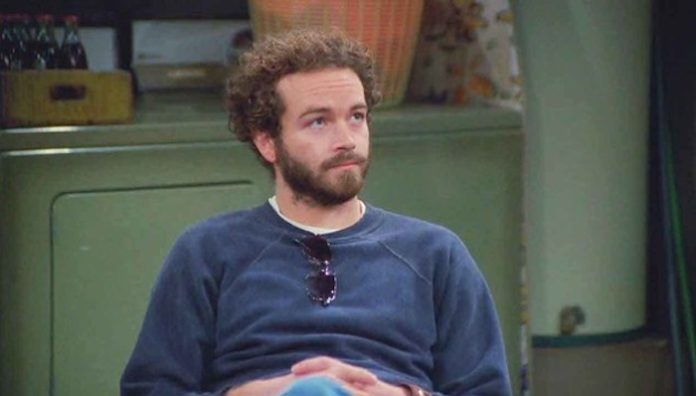
Danny Masterson — an actor best known for starring as Steven Hyde on That ’70s Show from 1998 to 2006 and being a practicing Scientologist — has been charged with and arrested for three counts of rape by force or fear dating back to the early 2000s in Los Angeles, California. According to the District Attorney’s Office, the actor is accused of raping a 23-year-old woman between January and December 2001, a 28-year-old woman in April 2003, and a 23-year-old woman he had invited to his Hollywood home sometime between October and December 2003.
Initially, he was under investigation for sexual assault by the LAPD in 2017, just at the start of the #MeToo movement. He has long denied the allegations, and his attorney has released a statement considering the newly-filed charges:
“Obviously, Mr. Masterson and his wife (actress, Bijou Phillips) are in complete shock considering that these nearly 20-year-old allegations are suddenly resulting in charges being filed, but they and their family are comforted knowing that ultimately the truth will come out. The people who know Mr. Masterson know his character and know the allegations to be false.”
According to the District Attorney’s Office, charges were not filed against Masterson in two other investigations due to insufficient evidence and the statute of limitations for the alleged crime. His bail was set at $3.3 million and he has bonded out. If convicted as charged, Masterson could face a possible maximum sentence of 45 years to life in state prison.
There’s a ton of new information floating around in this case.
There are the Twitter-led conspiracy theories about the connection between the sexual assault victims, which are becoming incredibly more popular. What’s more, his wife has been supporting him through multiple sexual assault allegations. However, the support that a man’s wife gives him doesn’t exonerate him of any wrongdoings nor does it establish innocence. Victims always deserve to be heard in full, have their pain acknowledged, and get justice.
Moreover, a person can be guilty of odd behavior that portends to sexual assault. In light of these allegations, many people have come out on Twitter saying that they too have experienced Masterson’s inappropriate behavior.
The #MeToo movement has shined a spotlight on rape culture — an environment in which rape is prevalent and sexual violence against individuals considered normalized and excused in both the media and popular culture. The men who participate in it and the men who excuse it with a “boys will be boys” attitude have also been forced to reflect on their actions. The #MeToo movement has also empowered survivors to tell their stories — regardless of the time it took them to open up or the missing details. Nevertheless, despite this progress, rape culture is still very much alive.
Here are 3 ways that you can combat rape culture now:
1. There’s a close link between sex and violence in our society. Change it.
According to Psychology Today, there’s a strong link between sex and violence. With the language we use to describe sex (think conquest, surrender, submission, etc.) and the actions we take during sex (biting, choking, spanking, cuffing, and scratching). This link is also visible in the aggressive means used to get it — dating back to elementary school when boys would push girls around because they “liked” them. Reject this by getting consent for sex and the actions that you will take with your partner. Put slow, gentle sex at the top of your priority list until you get the signal that it’s OK to engage in riskier acts. Reject viewing your partners as conquests but as full human beings who are equal to you.
2. Do not blame victims for what has happened to them.
Rape culture treats the behavior of the victim as a problem. It claims that it must be rectified to save them from sexual assault. It also forces potential victims to constrain their lives on both professional and personal levels. Victims (who are most often than not women) receive a set of rules to follow: avoid drinking and fraternizing with those you don’t know, watch how you dress for a night out and make sure you’re coming home at a safe time.
According to RAINN, sexual violence affects all populations, often goes unreported, and young women and girls are at the highest risk of sexual violence while 1 in 10 men are rape victims. So, make sure to be supportive and listen to survivors’ stories without questioning or blaming them for it. Do not cite age, sexual orientation, the time of day, or the clothes they wore as reasons for the crime. Understand that becoming a victim is out of their control and help them in whatever way you can. It can go a long way.
3. Define your own manhood, personhood or womanhood.
Be critical of how the media portrays and talks about sex, personal relationships, and violence and refuse to let stereotypes shape your actions. Speak up when you hear your friends trivializing rape and sexual assault through jokes or when you witness an interaction that falls on the spectrum of sexual assault or coercion. Be respectful of the physical space between yourself and others even in casual settings. Advocate for convicting those who are guilty of rape — celebrities and everyone in between — so that the survivors can get justice. Reimagine and reexamine masculinity and eliminate the toxic kind. Practice intersectionality and move the stories of marginalized communities to the center.
With Danny Masterson’s arrest and holding other powerful men accountable for their behavior, a step towards progress has been made. We can push this even further by making conscious decisions to refuse to feed into rape culture. We can change the status quo together.
Featured image via Fox That 70s Show


















